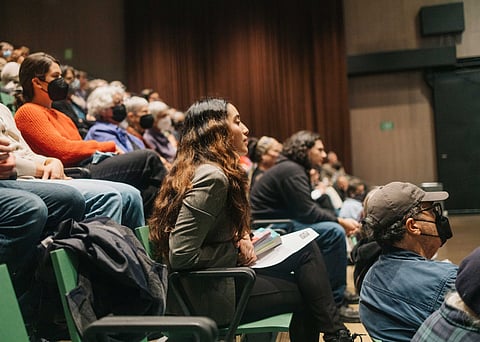How to Read a Poem: Four Tips from Seattle-Area Poets and Writers
Courtesy of The Seattle Public Library.
Poetry is blooming all over Seattle, and not just because it's National Poetry Month.
For only the second time in the history of The Seattle Public Library's citywide book club, Seattle Reads, a book of poetry has been selected. Edited by U.S. Poet Laureate Ada Limón, You Are Here: Poetry in the Natural World is an anthology of 50 poems that explore the power of place and local landscapes.
Seattle also has a new Civic Poet, Dujie Tahat, who has big plans to bring poetry into civic life; and the Library is collaborating on a Poetry in Public series, curated by Poet Planner Laura Da', which embraces the poetry of our daily lives.
But what if you don't consider yourself a poetry person? What if you find this genre challenging to understand?
At the Library's recent kickoff for our 2025 Seattle Reads programming, local poets and writers addressed this question by sharing their favorite tips for enjoying this incredibly diverse art form. A key takeaway: Poetry is for everyone, and any way you choose to enjoy it is the right way.
Take Sips
Stesha Brandon, Literature and Humanities program manager for the Library, described herself as "poetry curious," and said she is currently reading one or two poems a day from You Are Here in the morning with her coffee. Then she'll let it "percolate during the day."
Similarly, former Washington State Poet Claudia Castro Luna said that she reads an anthology like You Are Here in little bits, like savoring chocolate cake. "My suggestion is to take it slow, read one or two at a time and let the images work through you."
Listen Out Loud
Another key theme was that one of the best ways to appreciate poetry is to listen to a poem out loud. Castro Luna noted that poetry is carried through the line breaks and cadences. "A poem is half-baked until you read it out loud and it finds an audience," she said. "When a poem reaches the ears of the person listening it blooms."
José Luis Montero, board president of Seattle City of Literature and acting director of Hugo House, said he often goes online to find a video of the author reading the poem. "You can find the rhythm the poet intended to impart," he said.
KUOW radio host Katie Campbell recommended listening to the e-audiobook version of You Are Here, which is available on an unlimited basis through the Library.
Embrace the Ambiguity
Local poet Laura Da', whose poem "Bad Wolf" is included in the You Are Here anthology, taught middle school for almost 20 years. She enjoyed helping her students understand that poems are, by their nature, rich with multiple meanings. "One of the deep pleasures is to embrace entering ambiguity and the experience of being lost in a poem," she said.
Similarly, Montero said that when he's "easing into a poem" he's looking for layers. "I think of a poem as like an onion, with layers of meaning. When I'm reading poetry, I'm looking for those layers of meaning and I'm looking for that musicality."
Enjoy With Others
Finally, one of the best ways to appreciate poetry is in community. Seattle Reads has planned more than 20 programs celebrating all kinds of poetry and poets, from an afternoon of storymaking and storytelling at the South Park Branch on Saturday, May 3; to a talk with Lynda Mapes about her new book The Trees Are Speaking on Thursday, May 8; to three events with U.S. Poet Laureate Ada Limón on May 16 and 17.
Whether you're reading or listening to You Are Here, make sure to read three poems that poets at the kickoff discussed, including "Taking the Magnolia," by Paisley Rekdal (page 92), "You Must Be Present," by Jose Olivarez (page 28), and "You Belong to the World," by Carrie Fountain (page 6).
Put your new poetry-reading tips to practice with the following "Bad Wolf" by Laura Da'.
Bad Wolf
I husk the houses from the land, each one
as similar in size and shape as the battered
crates behind the shipping store. The lake
wasn't here with its jagged edges and dikes
puffing like keloid scars, so I drink it.
I uninvite to receive more clearly what
the fringed prairie might have been
with its controlled burns and bone games
and berries. In language class, I am learning
the story of the wolf who is perpetually punished
for his bullyish pride—made to pursue a hornet nest
and drown in his own reflection, snout
gleaming with the honey he was hoping to bite.
I repeat phrases and parse pauses from stresses.
The markers I seek are nearly impossible to find.
What is under this water and what was once water?
Here where a trail once crossed, people gathered
then the hop farmers dug axe-heads and projectile
points, still bearing the scar from the plow. Within
five miles the battles of the first treaty wars
are under the barns and the soccer goals and the signs
allowing recreational drone flying. At the prairie
a solitary Douglas Fir's high branches start
well above my head telling me it was once
one of many. I must move the tendons of my chin
and hold my tongue differently to string together
the consonants of my language. To say wolf, I have to
open my lips in a pantomime of alarm.
"Bad Wolf" is reprinted with permission by Laura Da'.
Find more about Seattle Reads at www.spl.org/SeattleReads. Print, e-book, and e-audiobook copies of this year's Seattle Reads selection are available in the Library's catalog. Find more poetry fun and events at www.spl.org/Poetry.
Editor's note: minor grammatical corrections were made to this article.
Help keep BIPOC-led, community-powered journalism free — become a Rainmaker today.


